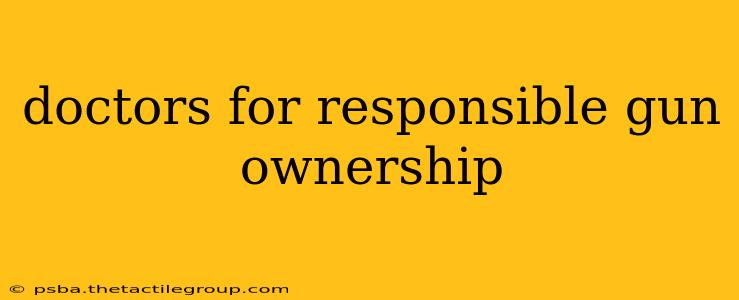The debate surrounding gun control in the United States is complex and often highly polarized. While much attention focuses on legislative action and political rhetoric, a lesser-known but increasingly influential voice is emerging: that of medical professionals advocating for responsible gun ownership. This isn't about stripping away Second Amendment rights; it's about promoting safety and reducing gun-related injuries and deaths through evidence-based approaches.
Understanding the Physician's Perspective
Doctors, nurses, and other healthcare professionals are uniquely positioned to understand the devastating consequences of gun violence. They witness firsthand the physical and emotional trauma inflicted on victims and their families. This direct experience fuels their commitment to finding solutions. Their advocacy isn't about taking away guns; it's about responsible gun ownership practices that mitigate risk.
Key Areas of Focus:
-
Safe Storage: Physicians are strong advocates for safe gun storage practices, emphasizing the importance of locking firearms away from children and individuals at risk of self-harm or harming others. They highlight the critical role of education and readily available resources in preventing accidental shootings and suicides.
-
Suicide Prevention: A significant percentage of gun-related deaths are suicides. Doctors are actively involved in promoting mental health awareness, reducing stigma surrounding mental illness, and connecting individuals with necessary resources to address suicidal ideation. They often advocate for improved access to mental healthcare services.
-
Reducing Gun Violence: Beyond suicide prevention, physicians are actively involved in research and public health initiatives aimed at understanding and mitigating gun violence in communities. This includes exploring the effectiveness of various interventions, such as background checks, red flag laws, and community-based violence prevention programs.
-
Data Collection and Research: Advocates for responsible gun ownership emphasize the importance of collecting comprehensive data on gun-related injuries and deaths. This data is crucial for informing public health strategies and developing evidence-based policies. They push for improved research funding to better understand the root causes of gun violence.
The Role of Education and Collaboration
The movement for responsible gun ownership relies heavily on education and collaboration. Doctors are not only treating the victims of gun violence but also educating patients and communities about safe gun handling, storage, and the importance of seeking mental health support when needed. They collaborate with law enforcement, community leaders, and other stakeholders to develop comprehensive strategies for reducing gun-related harm.
Addressing Misconceptions:
It's crucial to address common misconceptions surrounding this issue. Many believe that advocating for responsible gun ownership is inherently anti-Second Amendment. However, the majority of doctors involved in this movement respect the rights of responsible gun owners while simultaneously advocating for policies and practices that make communities safer.
The Future of Responsible Gun Ownership
The involvement of healthcare professionals in the gun control debate represents a significant shift. Their focus on evidence-based solutions, combined with their unique perspective and credibility, provides a crucial bridge in a deeply divided issue. By focusing on safety, education, and collaboration, they are contributing to a more nuanced and productive conversation about responsible gun ownership and its role in a safer society. The future of this movement hinges on continued research, data-driven policy recommendations, and a commitment to fostering dialogue and understanding across the political spectrum.

